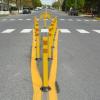Sussex Tech’s modified remote learning plan includes flexibility, creativity
On the first day of classes, Sussex Technical High School’s senior health professions students were learning vital signs.
“Raise your hand if you know what T-P-R stands for,” said Nancy Massaro to her class of senior health professions students.
“Temperature, pulse, and respiration,” one student responded from a small rectangle on a video screen.
Vital signs – also including blood pressure, height, weight, and pain – are critical knowledge for students who will be working as certified nurse assistants later this year. Equally important is knowing how to take them, which is why the students of veteran nurses Massaro and Tamara Lewis are learning remotely but coming to school in small groups later this month to put their knowledge into practice in the school’s fully equipped nursing lab.
That combination of virtual and in-person learning is at the heart of Sussex Tech’s modified remote learning plan. Students are starting the year learning remotely, but teachers have the flexibility to bring them to campus for voluntary hands-on instruction, demonstrations or practice.
That option was especially important for the school’s 16 career-technical areas, which are heavily hands-on, said Acting Superintendent Dr. Kevin Carson. “We know that our students and our teachers are eager to get back into the classroom and especially their technical fields,” Carson said. “This approach balances health and safety with the high-quality, career-technical education that Sussex Tech is known for.”
District leadership will evaluate the remote learning plan each marking period, examining current health statistics and state guidance in determining the direction for the second marking period, with the hope that students will be able to return to campus full time later in the year.
That’s also the hope of environmental and landscaping teacher G.L. Jefferson, who kicked off virtual lessons this year with his 10th-grade students focusing on a new ecology unit. He’s front-loading the semester with classroom-based topics and hoping to bring students back into Tech’s greenhouse and outdoor lab areas later.
“It’s difficult to do technical work through video – we can’t go out to the greenhouse or go out to the pond or get dirty in the wetlands,” he said. “The majority of this is going to be bookwork material, but that doesn’t mean it’s any less important. We’re saving the greenhouse and pond areas for when we finally get into school.”
He helps his students log into a video platform that creates an interactive experience, while acknowledging that they’d all prefer to be doing hands-on work. “I would much rather have you guys in school than looking at you through a computer screen,” Jefferson said during a recent session. “I’d love to hear your stories about stuff you did over the summer. But it’s a situation we can’t control. What we can definitely control is how you handle it, as either positive or negative.”
When other state restrictions are lifted, Tech’s health professions seniors will head out to complete required clinical hours in a healthcare setting, and then sit for the state CNA exam. Once they pass, they can go into the workforce full time for the remainder of the year under Tech’s Career Capstone work-based learning program.
“We’ll move through that, but we’re in a holding pattern right now,” Massaro told her students. “We’re going to do everything in our power to make this as easy as possible so you can practice at your own pace at home.”















































